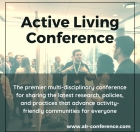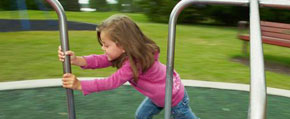We are pleased to announce an exciting new alliance between Active Living Research and GP RED to co-host and coordinate...
A Contextual Look at Safe Routes to School Program Implementation in Texas: Results of Qualitative Interviews
Presentation at the 2015 Active Living Research Annual Conference.
Background
The Texas Childhood Obesity Prevention Program Evaluation (T-COPPE), a five year project funded from July 2008 to August 2013 by the Robert Wood Johnson Foundation (RWJF), was designed to evaluate the statewide implementation of two national policies in Texas: 1) the Safe Routes to School (SRTS) program administered through the Texas Department of Transportation; and 2) the program rule revising the federal food allocation package administered through Texas Women, Infants and Children Nutrition Program, Texas Department of State Health Services. Initial findings from the SRTS evaluation and discussions with school administrators and teachers during the final year of the data collection period suggested that schools were still in the process of implementing their SRTS grant, and clarification was needed on the status of the implementation of the SRTS grants. In an effort to better understand the SRTS grant process for grant awardees and implementation of the SRTS program in Texas, RWJF provided additional funding in September 2013 to conduct interviews with community and state-level SRTS stakeholders. The interviews focused on the planning and implementation of the SRTS grants, and the sustainability of the SRTS program and other school safety programs.
Objectives
The purpose of the community and state-level SRTS stakeholder interviews was to gain a more comprehensive understanding of the implementation of the SRTS program in Texas, including the grant planning process, implementation, and future plans for the SRTS program.
Methods
The TCOPPE study included a natural experiment, which compared schools funded for SRTS in 2007 with comparison schools with similar characteristics but no funding. Structured phone interviews were conducted from February to May 2014 with local and statewide SRTS stakeholders including: 1) city and community individuals listed on the 2007 SRTS applications; 2) individuals from the public works department in communities that received 2007 SRTS infrastructure and planning grants; and 3) members of the Texas Bicycle Coalition involved in the review of the 2007 and 2009 SRTS grants. Eight communities from the original T-COPPE project were selected for the additional interviews, including 4 schools that received infrastructure project funding and 4 schools that received non-infrastructure project funding. Members of the project’s study team and steering committee identified potential state-level stakeholders. Interview questionnaires were developed by investigators with input from an external advisory committee. Separate questionnaires were developed for the community and state-level interviews, and project staff conducted the interviews with stakeholders over the phone. Participants were asked a series of open-ended and multiple-choice questions with follow-up to clarify their responses. Interviews were recorded and transcribed. Transcribed responses were organized and grouped according to thematic elements using standard procedures (Krueger & Casey 2009).
Results
Phone interviews were conducted with 34 community members from eight communities that received 2007 SRTS grants for either infrastructure or non-infrastructure projects and three state-level stakeholders from February to May 2014. Community members included school and district administrators, city officials, public works employees, engineers, city police, and volunteers from community groups. The SRTS programs in the communities interviewed were complete or in the process of finishing the program. The focus of the infrastructure projects was installing sidewalks and traffic signals, and the focus of the non-infrastructure projects was to create a plan for future infrastructure projects. Applicants participated in the SRTS program because they saw a need to improve safety at their schools, especially in low-income neighborhoods, and to increase opportunities for physical activity by enhancing the built environment around the school. As projects were completed, most communities perceived increased walking to and from school, increased neighborhood pride, and positive reactions from parents and teachers. Challenges that communities experienced that led to delayed implementation of SRTS programs were lack of communication with the granting agency and in some cases, within the community and changes in construction design standards.
Conclusions
The interviews conducted by the T-COPPE project provided insight on the implementation of the SRTS program in Texas and context for the survey and audit results. Communities in Texas want to provide their students with a safe environment to walk and bike to and from school, and the SRTS program was perceived as beneficial by providing funds for infrastructure and education projects. While most community representatives reported they completed their project, many had significant challenges when planning, creating, and implementing their plans. The biggest challenges were lack of communication and navigating approval processes and policies, which caused delays in the completion of the project.
Implications
The interview results show that the SRTS program is needed and valued by communities in Texas; however implementation without subsequent technical assistance and support is difficult and inefficient. Communities that had dedicated grant writers or resources, viable partnerships with local decision-makers, and community support were more likely to report more favorable results. Future grants should include at least partial funding up-front, rather than relying specifically on cost reimbursement policies, especially in smaller communities with less resources.
References
Krueger, RA and Casey MA. (2009). Focus groups: a practical guide for applied research. Los Angeles: Sage Publications.
Support / Funding Source
Robert Wood Johnson Foundation
- DOWNLOAD "2015_TravelSchool_Atteberry.pdf" PDF (1.84 MB) Presentations
STAY UP TO DATE
RECENTLY ADDED TOOLS & RESOURCES
MOVE! A BLOG ABOUT ACTIVE LIVING
The "Active Living Conference" aims to break down research and practice silos and...







